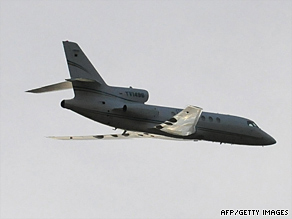
Deposed Honduran President Jose Manuel Zelaya landed in El Salvador late Sunday after a failed attempt to return to his homeland.
Zelaya told the Venezuela-based news network Telesur that his jet was denied permission to land Sunday evening in the Honduran capital, where military vehicles were arrayed on the runway. At least one person was killed and eight wounded after security forces opened fire and used tear gas on several thousand protesters who ringed the airport, said Hugo Orellana, a Red Cross director in Honduras. Protest leaders put the death toll at three. “I call on the Honduran armed forces to lower their weapons against the people,” Zelaya said at a news conference in San Salvador. “I want to express my sincere solidarity to the families that made sacrifices during a peaceful march, that the people organized voluntarily to welcome their president, who was elected out of the sovereign will of the Honduran people.” Senior U.S. administration officials, who insisted on anonymity because of diplomatic sensitivities, had said that if Zelaya was denied entry to Honduras they expected he would return to Washington on Monday to continue conversations at the Organization of American States. After being refused permission to land, Zelaya’s plane refueled in Nicaragua’s capital, Managua. During the stop, he met with Nicaraguan President Daniel Ortega — a leftist ally of Zelaya and Venezuelan leader Hugo Chavez — and told Telesur that his supporters were trying to remove obstacles from the runway in Tegucigalpa when troops opened fire. Watch military block runway » “The people pulled back when fired upon,” he said. In a statement read on national television in Honduras, the interim government said police opened fire when protesters tried to force their way onto airport grounds. The provisional government that took power after the military deposed Zelaya on June 28 said he would be arrested if he returned. But several thousand protesters who ringed the airport said they would protect him with a human cordon.
Don’t Miss
Honduras suspended from OAS
New leaders reject appeal for Zelaya’s return
U.S. ‘hits the pause button’ on aid to Honduras
iReport.com: Pro-Zelaya protesters take to streets
Zelaya called on the United Nations, the Organization of American States and the United States to act after his return was thwarted. “What are at risk are social reforms started in Latin America,” he told Telesur. “What we see is a return of the right in Latin America — a more reactionary right, more prone to killing, more fascist than in the past. They’re regrouping. It’s almost a conspiracy, a plot.” At a news conference earlier Sunday, provisional President Roberto Micheletti said that Zelaya’s return could create unrest in a country that has seen demonstrators for both sides in the streets since Zelaya was forced out. “I don’t want a single drop of blood to be spilled in Honduras,” Micheletti said. Zelaya was ousted on the day that he planned to follow through with a referendum that the courts and the Honduran Congress had ruled illegal and that the military said it would not support. Lawmakers voted to strip Zelaya of his powers and named Micheletti as president. The provisional government said the military action against Zelaya was backed by a court order and that arrest warrants had been issued against him for violating the constitution. The Organization of American States, a 35-nation hemispheric organization, on Saturday suspended Honduras’ membership for refusing to reinstate Zelaya. The U.N. General Assembly has demanded that he be restored; the United States and the World Bank have suspended some aid; and the European Union and other nations have recalled their ambassadors from Honduras. Watch report on OAS suspension of Honduras » In remarks Sunday, Micheletti extended a diplomatic branch to Venezuela’s Chavez and Nicaragua’s Ortega, two of Zelaya’s closest allies. The interim leader said his government was open to good-faith talks with the Organization of American States, but reiterated that his government was legitimate. “We are going to remain here until the country becomes calm,” he said.
After 18 years of nearly uninterrupted military rule, Honduras returned to civilian control in 1981. Since then, the military has not seemed interested in holding power in the nation of more than 7 million people, about 70 percent of whom live in poverty. Military interventions were once common in Latin America, but civilian governments have held sway since the 1980s. Before Sunday, the only other military revolt this decade was an unsuccessful 2002 coup attempt against Chavez, when troops displaced him but backed down days later and allowed his reinstatement.